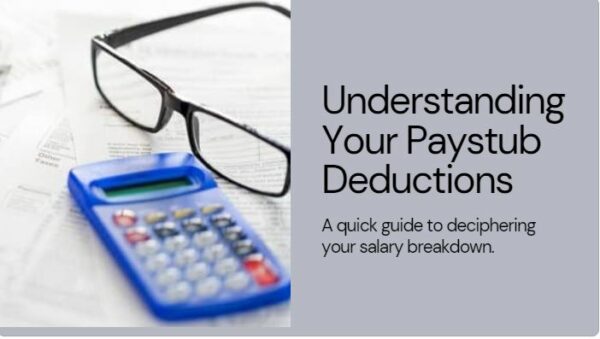Have you ever looked at your paystub and felt confused by all the numbers and deductions? Don’t worry, you’re not alone.
Understanding your paystub deductions can be tricky, but it’s important to know where your hard-earned money is going.
In this guide, we’ll break down the most common deductions you might see on your paystub and explain what they mean.

What is a Paystub?
Before we dive into deductions, let’s start with the basics. A paystub is a document that accompanies your paycheck, either in physical or digital form.
It provides a detailed breakdown of your earnings for a specific pay period, as well as any deductions or taxes withheld.
Your paystub typically includes information such as:
- Gross earnings: The total amount you’ve earned before any deductions.
- Net earnings: The amount you take home after deductions.
- Taxes withheld: Amounts taken out for federal, state, and local taxes.
- Deductions: Any other amounts withheld from your paycheck, such as for retirement contributions or health insurance premiums.
Now, let’s focus on understanding the various deductions you might encounter on your paystub.
Common Deductions Explained
- Federal Income Tax: This is the tax you owe to the federal government based on your income. The amount withheld depends on your tax filing status, number of allowances claimed, and income level. The more allowances you claim, the less tax will be withheld from your paycheck.
- Official Link: Internal Revenue Service (IRS)
- State Income Tax: If you live in a state that imposes income tax, you’ll see a deduction for state taxes on your paystub. Like federal taxes, the amount withheld varies based on your income and state tax laws.
- Local Taxes: Some cities and municipalities levy their own income taxes. If you live or work in an area with local income tax, you may see a deduction for these taxes on your paystub.
- Social Security Tax: This tax funds the Social Security program, which provides retirement and disability benefits. The current rate is 6.2% of your earnings, up to a certain income limit set by the government.
- Official Link: Social Security Administration (SSA)
- Medicare Tax: Medicare is a federal health insurance program for people aged 65 and older, as well as some younger individuals with disabilities. The Medicare tax rate is 1.45% of your earnings, with no income limit.
- Retirement Contributions: If you participate in a retirement savings plan through your employer, such as a 401(k) or 403(b), contributions to these plans may be deducted from your paycheck before taxes. This can help lower your taxable income and save for retirement.
- Official Link: Employee Benefits Security Administration (EBSA)
- Health Insurance Premiums: If you have health insurance coverage through your employer, you may see deductions for your share of the premiums. These deductions help cover the cost of your health insurance plan.
- Official Link: HealthCare.gov
- Other Deductions: Your paystub may also include deductions for other benefits or expenses, such as life insurance premiums, union dues, or charitable contributions.
Understanding Deduction Codes
Your paystub might use codes to represent different deductions. Don’t be afraid to ask your employer’s HR department for a legend explaining these codes.
Using Your Paystub Information
Your paystub can be a valuable tool for managing your finances. Here are some ways you can use the information:
- Track your income and expenses: Use your paystub information to create a budget and track your spending.
- Prepare for tax season: The amounts listed in your paystub deductions section can help you estimate your tax liability and ensure you’re withholding the right amount throughout the year.
Tips for Understanding Your Paystub:
- Review Your Paystub Regularly: Make it a habit to check your paystub every time you receive a paycheck. This will help you spot any errors or discrepancies.
- Ask Questions: If you don’t understand a deduction on your paystub, don’t hesitate to ask your employer or HR department for clarification. It’s important to know where your money is going.
- Keep Records: Keep copies of your paystubs for your records. You may need them for tax purposes or to resolve any disputes in the future.
- Update Your Withholding: If your financial situation changes, such as getting married or having a child, you may need to update your withholding allowances to ensure the correct amount of tax is withheld from your paycheck.
Understanding your paystub deductions is an essential part of managing your finances. By knowing where your money is going, you can make informed decisions about budgeting, saving, and planning for the future.
How to Read Your Paystub
- Gross Pay: This is your total earnings before any deductions.
- Taxes: Look for separate lines showing federal, state, and local taxes withheld.
- Deductions: Check for any other deductions like retirement contributions or health insurance premiums.
- Net Pay: This is the amount you actually take home after all deductions.
Importance of Understanding Your Paystub
Understanding your paystub is crucial for several reasons:
- Budgeting: Knowing where your money is going helps you budget effectively and plan for expenses.
- Tax Planning: Understanding your tax withholdings can help you avoid surprises at tax time.
- Benefits Awareness: Being aware of your benefit deductions ensures you are utilizing the benefits you are paying for.
Official Resources for Further Information
For more detailed information on paystub deductions, you can refer to official resources like:
- Internal Revenue Service (IRS): The IRS website provides comprehensive information on federal tax withholdings and deductions. Visit IRS.gov for more details.
- Department of Labor: The Department of Labor offers resources on wage and hour laws, including information on pay stub requirements. Visit DOL.gov for additional insights.
Conclusion
Your paystub may look complicated at first glance, but with a little guidance, you can decipher its contents and gain a better understanding of your earnings and deductions.
Remember to review your paystub regularly, ask questions if you’re unsure about anything, and keep records for your records.
By taking control of your finances and understanding your paystub deductions, you’ll be better equipped to manage your money and achieve your financial goals.
So, the next time you receive your paystub, take a closer look and empower yourself with financial knowledge!
